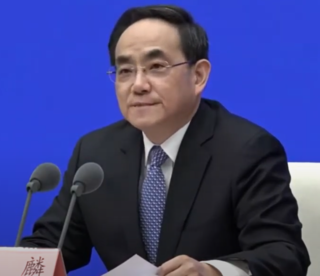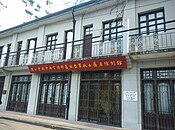
China Central Television is the national television broadcaster of China, established in 1958 as a propaganda outlet. Its 50 channels broadcast a variety of programming to more than one billion viewers in six languages. CCTV is operated by the National Radio and Television Administration which reports directly to the Chinese Communist Party (CCP)'s Central Propaganda Department.

The Politburo Standing Committee (PSC), officially the Standing Committee of the Political Bureau of the Central Committee of the Communist Party of China, is a committee consisting of the top leadership of the Chinese Communist Party (CCP). Historically it has been composed of five to eleven members, and currently has seven members. Its officially mandated purpose is to conduct policy discussions and make decisions on major issues when the Politburo, a larger decision-making body, is not in session. According to the party's constitution, the General Secretary of the Central Committee must also be a member of the Politburo Standing Committee.

The State Council Information Office is the chief information office of the State Council of the People's Republic of China and an external name of the Central Propaganda Department of the Chinese Communist Party.

The Central Military Commission (CMC) is the highest national defense organization in the People's Republic of China, which heads the People's Liberation Army (PLA), the People's Armed Police (PAP), and the Militia of China.
The mass media in the People's Republic of China primarily consists of television, newspapers, radio, and magazines. Since the start of the 21st century, the Internet has also emerged as an important form of mass media and is under the direct supervision and control of the Chinese government and ruling Chinese Communist Party (CCP). Media in China is strictly controlled and censored by the CCP, with the main agency that oversees the nation's media being the Central Propaganda Department of the CCP. The largest media organizations, including the China Media Group, the People's Daily, and the Xinhua News Agency, are all controlled by the CCP.

The Foreign Affairs Commission of the Central Committee of the Chinese Communist Party, commonly called the Central Foreign Affairs Commission, is a commission of the Central Committee of the Chinese Communist Party (CCP) that exercises general oversight on matters related to foreign affairs.

Propaganda in China refers to the use of propaganda by the ruling Chinese Communist Party (CCP), or historically the Kuomintang (KMT), to sway domestic and international opinion in favor of its policies. Domestically, this includes censorship of proscribed views and an active promotion of views that favor the government. Propaganda is considered central to the operation of the CCP and the Chinese government, with propaganda operations in the country being directed by the CCP's Central Propaganda Department.
Internal media of China enables high-level Chinese Communist Party (CCP) cadres to access information that is subject of censorship in China for the general public.

The Organization Department of the Central Committee of the Chinese Communist Party is a human resource management department of the Central Committee of the Chinese Communist Party (CCP) that controls staffing positions within the CCP.

The Xi Jinping–Li Keqiang Administration is the administration of China from 2013 to 2023. Xi Jinping and Li Keqiang succeeded Hu Jintao and Wen Jiabao after the 12th National People's Congress.

The Central Guidance Commission on Building Spiritual Civilization (CGCBSC), officially known as the Central Commission for Guiding Cultural and Ethical Progress, is a commission of the Central Committee of the Chinese Communist Party. It is tasked with educational efforts to build a "spiritual civilization" based on socialism and the goal to build a socialist harmonious society, according to the official Chinese Communist Party (CCP) policy.

The Central Leading Group for Propaganda, Ideological and Cultural Work is a leading small group of the Central Committee of the Chinese Communist Party (CCP) responsible for nationwide propaganda.
The Central Organization and Propaganda Leading Group was an agency under the Politburo of the Chinese Communist Party that existed during the Cultural Revolution.
Tuo Zhen is a Chinese official, serving the Chief Editor and President of the People's Daily, the official mouthpiece of the Central Committee of the Chinese Communist Party since April 2018. From July 2015 to March 2018 he as the deputy head of the Central Propaganda Department of the Chinese Communist Party (CCP). Tuo is the former provincial propaganda chief of Guangdong, during which he was widely known for his involvement in the 2013 Southern Weekly incident. He has also served as the vice-president of the state-run Xinhua News Agency.

The Standard Chinese word xuanchuan "dissemination; propaganda; publicity" originally meant "to announce or convey information" during the 3rd-century Three Kingdoms period, and was chosen to translate Russian propagándaпропаганда in the 20th-century People's Republic of China, adopting the Leninist concept of a "transmission belt" for indoctrination and mass mobilization. Xuanchuan is the keyword for propaganda in China and propaganda in the Republic of China (Taiwan).

The Cyberspace Administration of China is the national internet regulator and censor of the People's Republic of China.
Li Shulei is a Chinese politician who is the current head of the Publicity Department of the Central Committee of the Chinese Communist Party and a member of the Politburo of the Chinese Communist Party. Previously, he served as the executive vice president of the Central Party School and the deputy executive head of the Publicity Department. Li spent most of his career in academia, before being dispatched for a short stint as head of the propaganda department in Fujian, then as head of discipline inspection in Beijing. He is an important advisor to CCP general secretary and paramount leader Xi Jinping.

Xu Lin is a Chinese politician, who is currently serving as the Communist Party secretary of Guizhou. Previously he served as director of the State Council Information Office and director of the National Radio and Television Administration. He also served as the main official in charge of internet policy, the head of the Cyberspace Administration of China, from June 2016 to July 2018. Xu was previously the head of the Shanghai propaganda department and later Chinese Communist Party Committee Secretary of Pudong.

The 4th National Congress of the Chinese Communist Party was held in the Shanghai International Settlement at a shikumen residence in No. 8, Lane 256, Dongbaoxing Road, between 11 and 22 January 1925. The congress was attended by 20 participants representing 994 party members of the Chinese Communist Party (CCP). The congress succeeded the 3rd National Congress of the Chinese Communist Party and preceded the 5th National Congress of the Chinese Communist Party. A congress report was drafted by Chen Duxiu who represented the 3rd Central Executive Committee of the Chinese Communist Party.
Chen Ruifeng is a Chinese politician who is the current director of the National Religious Affairs Administration and deputy head of the United Front Work Department, in office since March 2023.











